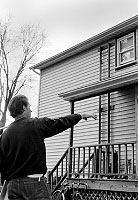

In a school year when fires swept across Oberlin, landlords of rooming houses have been forced to seriously rethink the safety of their rentals. But when even city officials have failed to properly institute fire code regulations, who is to blame?
Oberlin Fire Chief Dennis Kirin, who was hired two years ago by the city, said that state fire codes have not been correctly applied to rooming houses in Oberlin for many years, unbeknown to the landlords.

Hardwire alarms and proper fire exit requirements, have been required by the Ohio Basic Building Code (OBBC) since 1977. Kirin and City Manager Rob DiSpirto were dismayed to find neither requirement was enforced in Oberlin. The duo initiated increased enforcement, but landlords have not reacted favorably to these regulations.
In August of 1996, the city sent a letter to rooming house owners stating: "After an evaluation of the existing City Ordinances under Section 1353 and the current requirements as set forth under the Ohio Basic Building Code, it is the intent of the City of Oberlin to immediately inaugurate steps to bring all new and existing rooming houses into full compliance with current safety standards."
Rooming houses are defined as homes housing five people or more. Landlords displeased with the city's actions claim city officials are ignoring unliscened and ill-classified homes at their expense.
The problem with the law stated in the letter, in some landlords' eyes, is that it allows local officials to retroactively apply the OBBC which Oberlin is not permited to do. Landlord Van Kirkendall said, "I have always abided by what the city asked me to do. What they said in the beginning is not what they are saying now."
Landlord Carol Graham personally contacted the Executive Secretary of the OBBC, John Brant, for clarification of the letter. Brant responded, "If local officials are using the Ohio Basic Building as the basis for the changes which they are ordering you to make to your buildings they are violating statutory law and the Ohio Basic Building Code."
However, Brant felt that the city was allowed to create its own laws as long as officials didn't contradict state law.
The difference of opinion between landlords and city officials regarding state fire codes ultimately resulted in an appeal. The Ohio Board of Building Appeals ruled that the City of Oberlin cannot retroactively apply state building codes to rooming houses. Several landlords had complained that complying with state codes became prohibitively expensive, and questioned the city's authority in setting safety standards for the landlords' tenants.
Landlord Glenn Gall willingly paid for a $25 city license, but put his foot down at applying for a state license, which costs several hundred dollars more. As a result, Gall received a citation, and got an attorney to take over the matter.

"The key point of the decision," said Susan Zidek, Gall's lawyer, "is the city doesn't have the power to apply codes retroactively."
Gall's case was heard by the State Board of Appeals in March, and decided in favor of the landlord. The basic fact of the matter was that the city did not have the authority to apply the OBBC.
John Gibbon, attorney for three other Oberlin landlords who ultimately accepted inspections after months of prolonging, said of the court ruling, "In light of that decision, the city has agreed the inspection will be limited to city codes. This will not be an excuse to do an OBBC inspection. We're now satisfied that they will inspect only for what they used to inspect for and not use it as pretext for an OBBC general inspection."
After learning of the Ohio Board of Building Appeals' rule, College President Nancy Dye had said, "I have said since this issue began that the college is completely supportive of the city's code. I think it behooves all of us to know where we're living."
On March 11, President Dye sent an open letter to the Oberlin community listing five landlords as owners of unlicensed rooming houses. An excerpt of the letter states: "Unfortunately, however, some Oberlin landlords refuse to recognize the authority of the city to inspect rental housing and to enforce local and state fire codes."
In a crossfire, the landlords filed a $75,000 suit against Dye and Oberlin College. The landlords, Gall, Kirkendall, Carol Graham, David Sonner and Betty Baxter, claimed that Dye's letter improperly interfered with their contractual relationships.
Fire Chief Kirin, however, approves of the way Dye and the College have handled the issues at hand. He said, "I believe the College has been extremely supportive of fire safety on behalf of the students."
The debate continues. The city has placed a moratorium on all rooming house liscenses in hopes of subduing the flames.
You can't just yell fire: Oberlin landlords complained that the city and the college were damaging their business through excessively stringent fire codes and the label of unsafe, respectively. (photos Zach Fried and staff)
Copyright © 1998, The Oberlin Review.
Volume 126, Number 24, May 22, 1998
Contact us with your comments and suggestions.